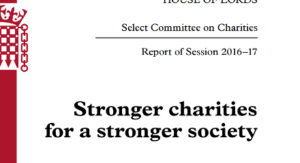Among all the recommendations in the House of Lords report into charities, those affecting funding are the most key, says David Ainsworth.
When the House of Lords originally announced its plans for an inquiry into charities, its concern was very specific about the scope. It wanted to examine concerns about the sustainability of the sector.
In the end, the peers on the committee took evidence on an extraordinary range of issues, from fundraising to governance to technology. But the report itself comes back to this core issue of sustainability.
That isn't the only issue, certainly. The report is critical of the Charity Commission over its governance and plans to charge for regulation. It reinforces the belief that charities must be free to speak out - something which was a major issue a year ago but has faded back recently. And there is an obvious feeling that more must be done in the sector itself to improve charity governance - although this latter point feels like an issue which is resistant to committees and interventions.
Concrete interventions such as time off for volunteering, and more funding for training and stronger infrastructure may well be helpful. Easier payment for trustees is probably not helpful.
But mostly it requires everyone in the sector to give it a higher priority, over a long period of time, and this is not something that can easily be engineered in Whitehall. Government will respond to the committee on this issue, but it is questionable how much it can do.
It comes down to funding
Really the sustainability of the sector comes down to funding, and this is where the report - correctly - identifies that government can do the most good. And, unfortunately, the most harm.
Other recommendations may well prove more eye-catching, but the key issues which will affect the long-term success of the sector are the reform of commissioning - including an end to the government's obsession with social investment and particularly social impact bonds - and a call for a return to grant funding.
The committee has correctly identified all the issues here. Payment by results is a blight on the sector.
Larger and larger contracts will send many charities to the wall, removing expertise not easily replaced. Technocratic and opaque commissioning processes are far too prescriptive and use up huge amounts of resource whilst delivering little benefit. Core funding is harder and harder to find. Contract periods are far too short. And social investment, while a really good idea for a fairly limited group of organisations, will not solve the problems of a poorly designed system.
The irony is that the commissioning system works for no one, not even the funders. It is more harmful to vulnerable people than anyone else, because it forces charities to intervene too late, and on too limited a basis, after their lives have been needlessly damaged.
But it harms government, too, because in the long run it costs far more. The crisis in social care is just the latest and most acute example, from which, it seems likely, few lessons will be learned.
Nor is charitable funding much better, though. Too much is dribbled out in little pots, without rhyme or reason, forcing charities into producing wasted pages of unsuccessful applications. Too often, funders do not gather evidence of what works, and prefer to back speculative innovation rather than projects with proven track records.
What should be done?
So what is to be done about this? The Lords report, having elegantly summarised the problems, seems only to have as its answer that everyone should do better. A lot of its recommendations suggest that government have regard to this, or give consideration to that. And this, basically, seems unlikely to drive much change.
I suspect the OCS will be all to happy to follow a well-worn policy path with these recommendations: accept entirely and ignore completely.
Perhaps it is unrealistic to expect too much. Government contracts were of variable standard even when money was plentiful. Now there isn't any, it may be unreasonable to hope for more thoughtful commissioning. Although as others in the sector said, following the Budget, we have to at least try, or we should go home now.
You might also be interested in
Where the government can help is by strengthening the social value act, by reviving and supporting the Compact, and by committing commit serious central money to grant funding, preferably in deprived areas.
This idea of grant funding is what it's all about. Government grants to charities are pound for pound the best way of solving social problems that this country has, and they should be increased, not cut. While the £2bn funding from dormant assets would certainly be a good place to start in this ambition, government should put its hand in its own pocket, as well.









